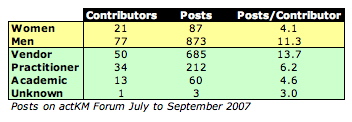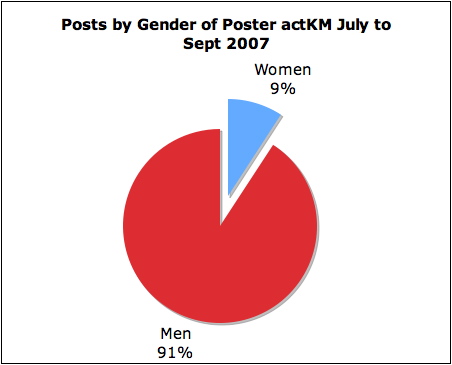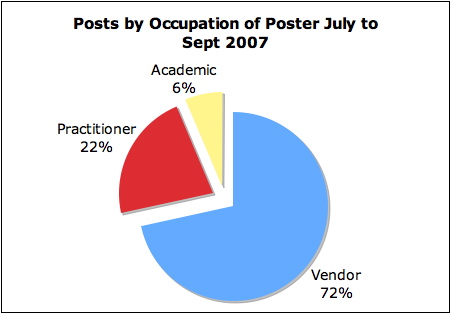Do Knowledge Managers Really Want to Share Knowledge?—Sharing as a Mating Game

I’ve had a creeping suspicion for some time that knowledge managers are fine about encouraging others to share knowledge, but that dictum doesn’t apply to them. In my role as President of iKMS I am always trying to get knowledge managers to share, and the ones who do are in the brave minority - even then, they tend to be far more reluctant to share in a public forum than in a private one. They have reasons, of course: lack of experience and confidence, lack of clear progress and successful results to show, restrictions by employers. But in such a young profession, with such instability of career progression and continuity of KM staff, with extensive inexperience among managers who are responsible for KM, sharing is about the only way to get access to experience faster. The obsession with success is an illusion born of that inexperience. We learn fastest through examining lack of success, and the more mature professions such as medicine and law and engineering recognise that. They have rituals for anatomising failure, and it’s not for fun, it’s because that’s how they learn and survive.
It seems I’m not alone in my suspicion. I’ve been running a survey in preparation for presentations at the actKM conference and the iKMS conference this month and next. One of the questions asks what KM professional associations should do to support knowledge managers. Here’s a reply from an American respondent: “It is shocking how many KM practitioners I’ve spoken with that aren’t involved or don’t see the point meeting and sharing ideas with fellow KM practitioners – even when THEY are supposed to be the ones encouraging knowledge sharing, CoP, etc. The people to do this the best, sadly, are database and other technology vendors – they try to sell the importance of their product.”
“Exactly!” I thought when I read it. Anecdotal evidence, you might say. So I took a closer look at one of the most active international knowledge management discussion forums, actKM. I took three months of posts, between July and September 2007, and analysed them for the identity of the posters, first by gender, and then by occupation. For clarity, Practitioner means somebody working in a knowledge management role within an organisation. Vendor means somebody who sells services or technology in the knowledge management space (I’m a vendor). Academic means somebody who primarily works in a university in teaching or research (though they may also sell services).



I didn’t get as far as coding the posts for type of content, but any actKM regular will know that the conversation nowadays is rarely about practice, much more about theory, less about experience in KM, and more about opinion tournaments – some jousts more chivalrous than others, but tournaments nevertheless. Ask them to define knowledge or knowledge management, and you’ll have a month’s worth of hot debate. Make an enquiry about practical experience of conducting a knowledge audit or dealing with change management issues, and somehow they’ll turn it into a debate about the definition of knowledge or knowledge management.
Which is why I think the gender (im)balance is not irrelevant, alongside the overall participation imbalance and the relative silence of practitioners. And that’s why I have a photograph of prairie chickens performing in a lek at the head of this post. To quote wikipedia, “A lek is a gathering of males, of certain animal species, for the purposes of competitive mating display. Leks assemble before and during the breeding season, on a daily basis. The same group of males meet at a traditional place and take up the same individual positions on an arena, each occupying and defending a small territory or court. Intermittently or continuously, they spar individually with their neighbors or put on extravagant visual or aural displays (mating “dances” or gymnastics, plumage displays, vocal challenges, etc.).”
Forums like actKM seem to be ideal habitats for display behaviours – which males of many species (including the knowledge management species) seem especially predisposed towards. Who are the “females” in this game, one might ask? Why, the clients (the practitioners) of course, who sit passively by, not betraying any ostensible interest in the proceedings but observing nevertheless. actKM is more self aware than many communities, and has discussed “alpha male” behaviours on a number of occasions, but doesn’t seem to be able to get beyond them. And this kind of behaviour is not untypical of knowledge sharing behaviours generally in the knowledge management space. The published case studies, and those trotted out at conferences, are preening case studies perfectly designed for strutting the stage as well as for career portfolios – the knowledge managers who deliver them frequently end up as independent consultants selling their services.
Which is why I’m starting to get disheartened about knowledge management’s ability to mature and even survive as a profession. We’re just not serious enough about learning for learning’s sake, to improve the practice in organisations, to advance the cause. The people who seem most disposed to learn and share are consultants, who float between contexts but rarely have sustained impact in one context. And sustained impact is essential for collective learning in knowledge management, because the feedback loop is a long one, it can take years of sustained effort for an intervention to show results. We’re in a vicious cycle of stop-start interventions conducted in silos, where nobody stays long enough to learn what really works and doesn’t work in the long run, where nobody is willing to propagate that learning as it happens. It seems to me (exceptional individuals notwithstanding) we are not bold enough, not brave enough, not generous enough, to survive as a profession. Tell me I’m wrong.
Here’s the data for the actKM analysis actkm_posts_2007.xls
19 October Updated file with corrected classifications for Hulwana Mohd Labib and Lauchlan Mackinnon actkm_posts_2007v2.xls
32 Comments so far
Dave,
Some observations:
(1) the fact that there seems to be more and more project management certifications (e.g. PMP, CITPM).
Certification provides some form of “assurance of quality” but there is a gap between theory and practice. I have come across at least one PMP and a handful of CITPM who is below average in managing IT projects. And there are some excellent project managers who have no certification except from the School of Hard Knocks.(2) project manasgement (best) practices being captured and sold as books.
Just like books for KM, books on project management follow a similar spread in quality - most are above average, but some are actually quite good.Would be nice to hear you elaborate on “4 - almost certainly”, since (1) and (2) don’t seem to be very interesting discussion topics as these are quite generic issues whether we are talking about KM or project management.
Tell you what Siew Ning, I will aim to blog on this next week. That will link in with my keynote at KM World.
Your point 1 I agree with completely - and I think it may be a consequence of simplistic and over constrained certification proposals. The accounting profession is a profession because it has a mixture of examination and practice extending over several years administered by associations with government recognition and control, linked to Universities. This is not the case for project management. Equally the KM “Certifiers” who are using PMP as a model are also trivialising the siubject.
- Carole Goldin
Hi Patrick, is this a case of KM practitioners just not sharing an abundance mentality? Are we all just trying to protect our own small patches rather than jointly growing the pie and in the process robbing ourselves of opportunities to learn and earn more?
- Patrick Lambe
That’s certainly what I fear Carole..
- Dr. Mohamed Taher
Carole and Patrick:
Thanks a zillion.You got me a break. I was running from pillar-to-post looking for the areas where KM is being applied, and more so, that which is by Librarians, concerns librarins and the like.By the way, Patrick, I posted your mating posts’ link in my blog. Would be thankful, if you leave your visual signature (i.e., comments: most bloggers use the term religiously).
Stay connected, any ways.
Best wishes, MT
- Patrick Lambe
Thanks for all your comments folks, I’ve had to shut this thread down due to an enthusiastic spammer. More blogs when I’m back on planet earth!
Comment Guidelines: Basic XHTML is allowed (<strong>, <em>, <a>) Line breaks and paragraphs are automatically generated. URLs are automatically converted into links.

I decided to leave it uncapitalised ...
1 - yes in part
2 - yes in part
3 - no idea
4 - almost certainly
Posted on November 01, 2007 at 10:20 PM | Comment permalink